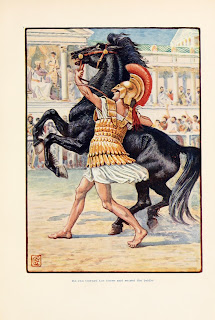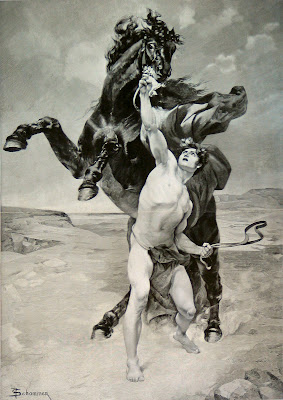Alexander the Great is perhaps the most famous of all the Ancient Greek Heros. He born into the ancient kingdom of Macedon, son of King Philip. He grew up to lead a military campaign of unparalleled success, conquering the entirety of Greece’s known world, and even pushing a bit beyond that. His fame in Greek history has led to the creation of many legends and mythical tales about him, most of which are collected in the Alexander Romance. Among these legends are accounts of his birth as a son of Zeus, his journey into the land of the Amazon warrior-women, and the origin of his faithful steed, Bucephalus.

The legend of Bucephalus begins in Alexander’s early childhood, when he was a mere twelve years old. One day, a horse trader came to Macedon offered King Philip a massive black stallion, clearly of the finest breed, but at the exoberant price of 13 talents. However, the King was not interested, since the horse could clearly not be tamed by any man who tried to ride it, not even Philip himself. Alexander then declared a wager to his father, that Phillip would buy the massive horse and allow Alexander one chance to tame it. Should he be successful, Alexander would keep the horse, but should he fail, he would personally work up the money and pay his father back himself.
Phillip agreed, and to the great surprise of all present, Alexander tamed the horse easily. For you see, Alexander was the only one among them who had noticed the horse showed fear of its own shadow. So upon approaching it, Alexander had merely turned the steed towards the sun, so it was unable to see the shadow beneath it. Throwing aside his fluttering clock, Alexander jumped upon the beast and tamed it as his own. King Philip, seeing the courage and ambition within his son, then declared to all present, “O my son, look thee out a kingdom equal to and worthy of thyself, for Macedonia is too little for thee”.
 Alexander named the horse Bucephalus, meaning “ox-head”, and with him began to carry out his father’s wish. Bucephalus served with Alexander in through numerous battles, and it was said that Alexander refused to ride any other steed. Some sources state that Bucephalus died of old age at thirty years. Others claim that Bucephalus died at the Battle of Hydaspes, where Alexander defeated King Porus and conquered the Kingdom of Pauravas. In his grief, Alexander founded a city at the site of the battle, and named it “Bucephala” in honour of his fallen friend.
Alexander named the horse Bucephalus, meaning “ox-head”, and with him began to carry out his father’s wish. Bucephalus served with Alexander in through numerous battles, and it was said that Alexander refused to ride any other steed. Some sources state that Bucephalus died of old age at thirty years. Others claim that Bucephalus died at the Battle of Hydaspes, where Alexander defeated King Porus and conquered the Kingdom of Pauravas. In his grief, Alexander founded a city at the site of the battle, and named it “Bucephala” in honour of his fallen friend.
In the Alexander Romance, Bucephalus is portrayed as having multiple mythic qualities. Some legends depict Bucephalus as a pegasus, others as one of Achilles’ own steeds. Regardless, the legacy of both the man and the horse are closely intertwined, and in legend Alexander is rarely seen without his Great Steed.
One particularly interesting result of the Legend of Bucephalus is the precedent seemingly founded by the great hero. Future emperors, seeking to emulate the famed Alexander, sought to have their own favorite horses to accompany them. Julius Ceaser was known to have one, and the eccentric Roman emperor Caligula was known to fuss greatly over his steed Incitatus. Caligula supposedly threw birthday parties for his horse, and appointed it as one of his consuls.


No comments:
Post a Comment
Note: Only a member of this blog may post a comment.